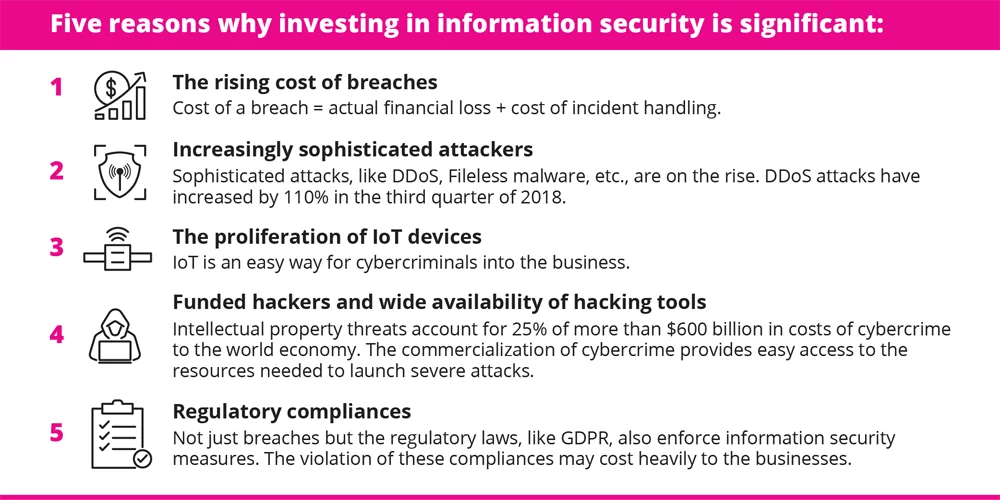The Impact of COVID-19 on Digital Transformation

The Coronavirus pandemic is an unprecedented one in the history of humanity and has taken the entire world off guard. Although human life is a major risk, and it is the greatest fear for us, the impact COVID-19 has had on the businesses globally cannot be left unaddressed.
To sustain business continuity amidst lockdown without compromising safety is a major challenge. The current situation is going to reshape the workforce and reposition digital transformation priorities in the long term. The impact of the shift which businesses have been forced to take as a result of COVID-19 will likely be felt for a long time.
Organizations are learning to collaborate in new ways; companies are realizing that they are capable of being fully functional despite delegating remote work. As a result, organizations will be compelled to consider digital transformation in order to facilitate the needs of a mass and remote workforce.
All along, digital transformation has been mainly seen among businesses under competitive threats such as tech-savvy industry disruptors. COVID-19 may be the mega-event that pushes everyone toward digital transformation.
The coronavirus outbreak has changed everything. Stock markets have crashed, airlines are experiencing irreparable losses and several small and medium businesses are shutting shops because they do not have what it takes to survive in this uncertain world.
Challenges that organizations face:
- No preparedness for such an event and improper infrastructure to manage the same from home is an alarming situation for businesses.
- Carrying out successful and effective communication and collaboration across locations, time zones and languages has become a pressing issue.
- Employee productivity, teamwork and driving innovation across such a geographically dispersed workforce, and seems like a distant dream.
- With intermittent and poor home network connections enterprises need to work out solutions that work in offline and low-bandwidth situations.
Here are a few ways organizations are overcoming the challenges leveraging solutions led by digital transformation:
Leveraging Collaboration tools
The concerns about the COVID-19 virus have led to a worldwide boom in remote working, as organizations encourage employees to stay home and cities, states and even some countries go on lockdown. There has been a shooting increase in the use of online collaboration tools for companies to ensure effective communication.
Several vendors, including Microsoft, Google, Slack, Zoom, Cisco and LogMeIn, are making chat, videoconferencing and other collaboration services free as demand for remote working booms.
The organisations need to identify, evaluate and have the right set of online collaboration tools for both employees and partners to carry out remote work effectively. There should be due consideration for the security and scalability before purchasing the subscription.
Consumer-centric Sales strategy
While everyone is anxious for the day when a proven vaccine allows us to return to our daily routines, will consumer buying habits really be the same as pre-COVID-19?
COVID-19 lockdown and social distancing has already altered the consumer buying patterns and might further impact it in the longer run.
Offer deferred payments, or sell in modules; Catering to clients urgent needs with rising demand by providing the tools to meet; Engage your existing clients, retaining them is crucial, go for that extra mile to ensure you invest in their success. Moulding your sales strategy to help your clients better will be a win-win situation.
Agile Business Continuity Plan (BCP)
Do you think the benefits of business continuity planning revolve solely around emerging unscathed from a seemingly unlikely possible disaster sometime down the road? Think again.
While, most organisations have a BCP manual that runs into over a hundred pages, which proved ineffective during the COVID-19 crisis situation. Hence, there’s a need to have an Agile BCP that should be triggered with minimal fuss, and in no time.
An agile business continuity programme has the potential to save lives, build confidence amongst your employees and customers, mitigate your financial risk, protect supply chain as well as give you a competitive advantage.
Instead of half-yearly and yearly BCP drills, there should be a provision to put the same to real test on a monthly basis by mandating the ‘Work from home’. In fact, some companies have already started thinking about leveraging ‘Work from home’ permanently as part of their company policy.
Hybrid Cloud strategy
Migrating your business to the cloud would be a good way to have agile business continuity in place. Along with cost-saving and competitive advantage cloud transformation also helps with mobility, flexibility, disaster recover, security and sustainability.
Fully Automated Factories
While the concept of fully automated factories/ Dark Factories has been resisted long due to it’s the implication on dark where there aren’t any people in it and no need to turn on the lights.
During this crisis, most manufacturing units had to either shut their production completely or operate on reduced capacity in order to ensure safe practices. The entire global supply chain is under tremendous pressure to meet the demands. Hence, Industry 4.0 transformation, the concept of ‘Dark Factory’ will become more relevant post-COVID-19.
Minimal or no humans on-site needs to become a reality to ensure better preparedness in future.
Information Security
The security of the data consisting of the customer and other sensitive information is the most crucial part. There has been a surge in security breaches during the COVID-19 period due to weak improper data security in remote work.
The recent example is about the security concerns highlighted in Zoom, wherein their management acknowledged that the product was not designed considering the sudden surge in the number of people using it remotely.
The organisation’s focus should be on making the ‘Information Security’ a part of the overall design.
Once we are over this crisis, the global trade dynamics will change, and the economies will bounce back stronger. Hence, we need to stay prepared and invest in Digital transformation to take the leap when needed. Gateway Digital is here to help you adopt digital transformation to sail through the uncertainties. To know more about our offerings, get in touch with us at hello@thegatewaydigital.com
Get in Touch
Related Blogs

Balancing Feature Development with Platform Enhancement: A Strategic Imperative

Managing IT Costs Effectively: A Strategic Approach to Balancing Growth and Efficiency

The Hidden Complexity of Scaling Cloud Operations: What Most Strategies Miss

Managing Technical Debt: Balancing Innovation with Sustainability

Maintaining Development Velocity While Ensuring Quality: The Balancing Act

Navigating Financial Strategies for Global Expansion in SaaS

Precision in Complexity: Redefining Capital Allocation for Sustainable Growth

Beyond Silos: Rethinking Cross-Functional Collaboration for Scalable Product Development

Simplifying Global Expansion: The Power of One Strategic Partner

The Unfinished Symphony of Digital Transformation: From Strategy to Execution

Beyond Traditional Process Intelligence: Integrating Emerging Technologies for a Competitive Edge

Tekninen Velka – Kuinka Se Haittaa Kasvua ja Miten Sen Saa Hallintaan?

A Deep Dive into Product Engineering: Process, Roles, and Best Practices

What is Cyber Resilience? An In-Depth Guide

A Comprehensive Guide to Cloud Transformation

24 Emerging Software Development Trends Transforming 2024

Is AI Secure? Addressing Cybersecurity Risks with AI

How Is Cloud Computing Transforming Sustainable Healthcare in the Nordics?

Gateway Digital is Neste Napcon’s Partner in Creating Digital Learning Environments for the Process Industry

Tuotekehitysyhteistyön avulla joustavuutta ja kustannushyötyjä – Case School Day

Petteri paju vahvistamaan Gatewayn myyntiä

Top 6 Trends Transforming Logistics and Supply Chain in 2020

Why is it Important to Hire the Right Employees to Grow your Business?

Miten IT-alan ammattilaisten vaje näkyy Suomessa?

How Can Emerging Technology Facilitate Faster Start-up Growth?

The Need For Smart Logistic Planning: Takeaways From The Suez Canal Crisis

Gateway Digital AS and Retailtech strengthen their strategic partnership

Gateway Digital and Digitate enters strategic partnership

The DACH cloud computing industry in 2021 and beyond

Why Germany is home to the most innovative Tech Startups

Dataplattform för att identifiera bilreservdelar vinner pris inom hållbarhet

AWS vs GCP vs Microsoft Azure: Everything you need to know

Ensuring a higher ROI on your Technology Investment: Here’s How

Why the future of Startups & Scaleups depends on Technology Partner

Infographic: Elevate your Business with Augmented Supply Chain

Infographic: Empowering the Digital Healthcare Ecosystem

Infographic: Why Strategic Technology Partnerships are imperative for ISVs

Infographic: How PES is Empowering the Digital Healthcare landscape

Impact of Covid 19 on the Automotive Industry

How COVID-19 is Changing the Face of Digital Healthcare

Transform your Digital Journey with Strategic Technology Partnerships

Succeed your Business with Partnerships – The New Normal for Fintech!

Supply Chain Focus Areas to Mitigate COVID-19 Disruptions

How Digital Transformation is Redefining the Healthcare Industry

Benefits of Digitising Your Product Development Process

How to Develop a New Product (From Concept to Market)

How Automotive and Technology Experts See the Future of Connected Vehicles through Future Tech 5G Service

Industry Digitization will be Top Opportunity for 5G business solutions

5G Products & Solutions in 2023 & Beyond– What Should we expect from 5g network software?

Everything You Need to Know About 5G network as a service

Cloud Companies Chase Future in Cybersecurity ‘Wild West’

The Future of Lawyers: Legal Tech, AI, Big Data And Online Courts

Why Covid-19 Could Expedite the Role of RegTech in Finance

3 Elements For Success With Mobility As A Service In Our Cities

Digitalization is Upending Global Logistics

Mastering the Duality of Digital: How Companies Withstand Disruption

iGaming Technology Trends to Watch

73% Growth and Instant Blockbusters: How Online Gaming Industry Is Blowing Up During the Pandemic

The 5 Biggest Cybersecurity Trends In 2020 Everyone Should Know About

Why Cybersecurity Is Really A Business Problem

Technological Disruption or Next Industrial Revolution?

What Will Be The Future Success Of Fashion Retail In The Digital Age

The Banking Industry Is Spending Wildly on the Latest Tech

Disruption in Manufacturing: Managing Unexpected Risks

5 Manufacturing Tech Trends Poised To Disrupt Your Business

Digital Disruption in the Manufacturing Industry

Future Factory: How Technology Is Transforming Manufacturing

Five Ways the Internet of Things is Transforming Businesses Today

The Mobility-as-a-Service Market will Register a CAGR of Over 35% by 2023

3 Ways Every Company Should Prepare For The Internet Of Things

The Three Stages Of Cloud Transformation: Application, Network, Security

Cloud Computing Seen as Tech Haven Amid Pandemic Uncertainty

How Multi-Cloud and Digital Transformation Fit Together

8 Ways Cloud Is Transforming Business

Mixed Reality Finds Its Niche in Industrial and Business Applications

Virtual Reality is Making Marketing and Training More Effective for Businesses

What Leaders Need To Know About Augmented Reality

The 5 Biggest Virtual And Augmented Reality Trends In 2020 Everyone Should Know About

DevOps Model: The Role of Quality Assurance Redefined

Quality Engineering Has DevOps and Agile in the Driving Seat

How QA Can Support Businesses in the Journey of Digital Transformation

Quality Assurance Is Critical In Software Development And Increasingly Automated

Resolving Challenges of Auto ISVs with Fruitful Technology Partnerships

Resolve Fleet Management Challenges with Innovative Digital Automotive Solutions

Top 3 Factors Impacting Customer Satisfaction of Modern Car Buyers

Fleet Telematics Solution: Driving Great Business for Automotive Ecosystems

Top Supply Chain Tech Trends

How Artificial Intelligence Benefits Logistics and Supply Chain Management

Fleet Management in 2024 & Beyond: What Does the Future Look Like?

How to Identify a Trusted online iGaming Solutions Provider?

Mastering Enterprise Digital Transformation: Building Blocks of a Successful Strategy

Center of Excellence: Building Intelligent Solutions for the Enterprises of Tomorrow

Want to Succeed in Digital Transformation? Choose the Right Technology Partner

Customer Satisfaction in an Ever-Evolving iGaming Industry

How to Tackle Security Risks in Digital Transformation

The State of Legal Tech: What Every Legal Business Must Know

Legal Technology in 2020 and Beyond

Want to Succeed in Digital Transformation? Choose the Right Technology Partner

Fulfilling Customer Experiences in the Digital Era: How to Go About It

Taking the Pain Out of Application Modernization
INDUSTRIES
PLATFORMS
SERVICES
CONSULTING
- AlvariumTM - Design Led ConsultingOpens a new window
- Digital Marketing Services
- Automotive Aftermarket
- Digital Logistics
- Remote Engineering


